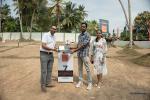In addition, the National Cancer Registry of Sri Lanka indicates a gradual rise in cancer incidence in the country annually according to a report released on its website.
While non-communicable diseases are one of the highest causes of death in Sri Lanka, cancer is becoming a serious concern for local medical practitioners.
Globally, cancer is one of the most researched areas of medical treatment due to the increasing number of cancer patients worldwide.
Cancer treatment is making breakthroughs in the world with advanced surgical and radiation therapy (RT) techniques, and immunotherapy drugs.
These different medical approaches have been proven successful at different stages of a patient’s treatment process.
Leading the way in facilitating advanced cancer treatment is Parkway Patient Assistant Centre in Sri Lanka which has helped thousands of patients lengthen their life span or completely beat the disease.
It is the counterpart for the hospitals that use the latest technology in their treatments for the best clinical outcome in the region.
Further information can be obtained from the Parkway Patient Assistant Centre representing Mount Elizabeth, Mount Elizabeth Novena, Gleneagles and Parkway East Hospitals in Colombo.
Parkway Patient Assistant Centre secret lies in the advanced personalized treatment plans Parkway specializes in that cater to patients’ individual care needs and expectations with a multidisciplinary team approach.
Some of these include:
• Intensity Modulated Radiation Therapy (IMRT) & Image Guided Radiation Therapy (IGRT)
Side effects of cancer treatments make some Sri Lankans hesitant of receiving treatment but the IMRT technique is an effective standard of care for many cancer types, with fewer side effects.
IMRT can focus intense beams on pre-designated targets in the body.
The accuracy of IGRT treatment is high. Both these techniques are more advanced than RT which shows limitations in the treatment delivery.
• Stereotactic Radiosurgery (SRS) and Stereotactic Body RT (SBRT)
Only 1–8 SRS and SBRT treatment sessions are enough for a patient.
These techniques can provide good disease control for the brain or the rest of the body though this treatment is recommended only for certain patients due to the large doses of radiation focused on small tumor targets.
• Proton Beam Therapy (PBT)
The major advantage of PBT over X-ray RT is the risk of side effects resulting from PBT is low as healthy organs are less exposed to radiation during the treatment.
It is often conducted in combination with surgery, chemotherapy, immunotherapy, or hormonal therapy.
Most Sri Lankan children suffer from leukemia.
PBT is good for child cancer patients as they are very sensitive to the long-term effects of radiation and adults who suffer from tumors such as chordoma, brain tumors, prostate cancer, esophageal cancer, and locally advanced head and neck cancers.
PBT lowers toxicity in treatments.
• Flash RT
Flash RT delivers radiation dose faster hence causing fewer side effects with high effectiveness.
It can be applied to X-ray RT, electron RT or PBT as well.
• Artificial intelligence (AI) in RT
AI helps to maintain pinpoint accuracy despite variations in the tumor location and improves image resolution, decision support, and prediction of long-term treatment outcomes.






















